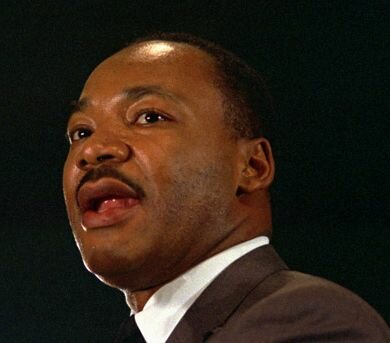A dream deferred?
Politics — By Sam Fulwood III on January 15, 2010 at 13:34Co-authored by By Melissa Boteach the Half in Ten Manager at Center for American Progress.
The Rev. Martin Luther King Jr. shifted his focus in the dwindling years of his life to an audacious, but achievable goal: ending poverty in the United States.

The Rev. Dr. Martin Luther King Jr. speaks April 15, 1967 at a peace rally in New York City. King shifted his focus near the end of his life to eradicating poverty in the United States. AP photo
In his book, Where Do We Go From Here: Chaos or Community?, King argued that the United States must change its attitude and approach toward the treatment of its poor citizens. He reasoned that since poverty knew no racial boundaries, he couldn’t limit his call for congressional action to assist only black Americans.
“In the treatment of poverty nationally, one fact stands out,” King wrote in 1967. “There are twice as many white poor as [black] poor in the United States. Therefore I will not dwell on the experiences of poverty that derive from racial discrimination, but will discuss the poverty that affects white and [black] alike.”
This was a radical—and unpopular—change for the preacher who is best known for pushing voting, employment, housing, and other civil rights for black Americans. At this point in his career, during what would become the final months of his life, he was widening his field of vision to seek an end to poverty among all Americans.
It’s appropriate as we pause to celebrate this year’s national holiday in memory of King’s 81st birthday to recall the relevance of his final struggle to the contemporary fight against poverty.
The most recent poverty data for 2008 reveal an America where nearly 40 million people—13.2 percent of Americans—live in poverty, and nearly one in three, or 31.9 percent, struggle to make ends meet at twice the poverty level.
Significant racial disparities persist in the data. Just as it was in the time when King preached, more whites than blacks or Latinos live in poverty in absolute terms. But blacks and Latinos disproportionately suffer material deprivation. In 2008, 8.6 percent of whites lived in poverty, compared to 24.7 percent of blacks and 23.2 of Latinos. The data are expected to be significantly worse for 2009, a year when rising unemployment pushed many families closer to economic instability.
Black and Latino Americans also continue to trail white Americans in unemployment rates and wages. The unemployment rate for white men over 20 was 9.8 percent in December 2009, but for black men over 20 it was nearly double that at 16.9 percent, and for Latino men it was a high 12.8 percent. Bureau of Labor Statistic figures for 2008 report that the median usual weekly earning for full-time wage and salary workers was $742 for white Americans, but only $589 for African-Americans and even lower at $529 for Latinos, underscoring the need to tackle racial disparities even as we aim to end poverty and create jobs for all Americans.
These numbers represent an affront to our moral sensibilities, as well as our economic self-interest and national competitiveness. The Center for American Progress released a report in 2007 showing that child poverty alone costs the United States $500 billion a year in lost productivity, higher health costs, and expenditures in the criminal justice system. We need national leadership from our government to systemically tackle this growing problem.
Nearly 40 years ago, King understood that previous national efforts to end poverty were stymied by a fundamental misunderstanding of the problem’s scope:
While none of these remedies [housing assistance, improved educational facilities, income assistance] in itself is unsound, all have a fatal disadvantage. The programs have never proceeded on a coordinated basis or at a similar rate of development. Housing measures have fluctuated at the whims of legislative bodies. They have been piecemeal and pygmy. Educational reforms have been even more sluggish and entangled in bureaucratic stalling and economy-dominated decisions. Family assistance stagnated in neglect and then suddenly was discovered to be the central issue on the basis of hasty and superficial studies. At no time has a total, coordinated and fully adequate program been conceived. As a consequence, fragmentary and spasmodic reforms have failed to reach down to the profoundest needs of the poor.
King’s observations hold true more than 40 years after his death, but 2010 is the year to change that.
Candidate Obama embraced during his campaign the goal of cutting poverty in half in 10 years. The Half in Ten campaign is advocating for the administration to translate that commitment into a government-wide target that can break down silos across government agencies, engage the private sector and the public, and animate cross-cutting solutions and enhanced coordination.
We can start by ensuring that job-creation proposals lift up the hardest-hit communities. The last economic recovery holds the distinct dishonor of being the first on record where poverty rates rose and median income fell despite rising profits and productivity. Congress must take three key steps to avoid a repeat performance and ensure that low-income, minority, and other traditionally vulnerable communities have the opportunity to participate in economic recovery.
First, Congress must invest in direct job creation that addresses long-neglected needs in communities. There is an immense need for workers that can provide health care services and weatherize homes; there are neighborhoods where deteriorating infrastructure calls for upgrades and new construction. Congress can put people directly back to work while simultaneously addressing unmet needs among populations suffering the most in this recession by funding direct jobs in these and other areas, investing in national service programs, and resourcing summer jobs programs.
Second, any sound strategy to rebuild the economy will recognize that our moral inclinations happen to gel with our economic goals. Economists across the ideological spectrum point out that helping the most vulnerable workers and families through food stamps, extensions of unemployment and COBRA health benefits, and refundable tax credits drives the kind of economic demand that keeps small businesses humming and ripples throughout the economy.
Finally, aid to states and localities makes common sense as a strategy to prevent further job losses and service cuts. If Congress fails to act, 900,000 more workers will lose their livelihood and there will be further cuts to the services that sustain Main Street America, including communities of color.
King directed the Southern Christian Leadership Conference in late 1967 to take the civil rights movement on yet another march on Washington, D.C. But unlike the one four years earlier that was the setting for his memorable “I Have A Dream” speech, King planned to deliver a speech that would speak to the “waves of the nation’s poor and disinherited” and to lead groups of poor people of all races in the spring of 1968 to demand “at least jobs or income for all.”
He never led that march, nor delivered a singular defining speech on poverty. His assassination in 1968 left that unfulfilled. Still, King left writings that reveal he understood the essential nature of poverty in the United States and the benefits that surely will follow in its demise.
What’s more, King plainly articulated the reality that continues to plague American society 40 years after his death. Just as it was in the late 1960s, prolonged and pronounced economic racial disparities and entrenched poverty across all races remains a source of friction and instability in 21st century America.
Candidate Obama spoke similarly of the need to tackle poverty during his historic presidential campaign. Now President Obama has an important opportunity to fulfill that promise by articulating and implementing a national goal to cut the U.S. poverty rate in half between 2010 and 2020, starting with a job creation strategy to lift up the hardest-hit communities.
Or as King said, “The curse of poverty has no justification in our age. . .The time has come for us to civilize ourselves by the total, direct, and immediate abolition of poverty.”
Tags: equity, health care, Martin Luther King, MLK, Politics, Poverty, reformAuthor: Sam Fulwood III (5 Articles)

Sam Fulwood is a Senior Fellow at American Progress, where he analyzes the influence of national politics and domestic policies on communities of color across the United States. Fulwood is the author of two books, Waking from the Dream: My Life in the Black Middle Class (Anchor, 1996) and Full of It: Strong Words and Fresh Thinking for Cleveland (Gray & Company, 2004). Prior to joining the Center, Sam was a metro columnist at The Plain Dealer in Cleveland, Ohio, the last stop in a nearly three-decade journalism career that featured posts at several metropolitan newspapers. During the 1990s, he was a national correspondent in the Washington bureau of Los Angeles Times, where he created a national race-relations beat and contributed to the paper's Pulitzer Prize-winning coverage of the Los Angeles riots in 1992.



 Share This
Share This Tweet This
Tweet This Digg This
Digg This Save to delicious
Save to delicious Stumble it
Stumble it





 Help make US Gov. own up to its racial disparities and eliminate them
Help make US Gov. own up to its racial disparities and eliminate them What “Precious” tells us about images Of blackness
What “Precious” tells us about images Of blackness Canadian Aboriginals need justice, not tributes
Canadian Aboriginals need justice, not tributes Making sure young black men count in 2010
Making sure young black men count in 2010







